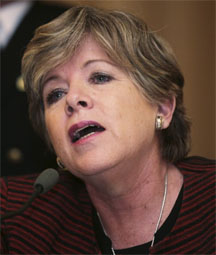SANTIAGO, (Reuters) – Latin America’s economy will grow at least 3.7 percent this year, but the region has not recovered fiscally from the Lehman Brothers crisis and should prepare contingency plans that bolster credit and help lower interest rates, the United Nations said on Monday.

Policymakers should focus more on monetary rather fiscal policies to help mitigate fallout from Europe if need be, and a disorderly Greek exit from the euro zone could be very negative for the region, said Alicia Barcena, head of the UN’s regional economic body, ECLAC.
“Our region is not better-prepared than in 2007 in terms of fiscal room,” Barcena told the Reuters Latin American Investment Summit. “However, it has the capacity for counter-cyclical policies on the strength of low indebtedness and international reserve provisions.”
Brazil and Chile have already drawn up anti-crisis plans, and others should follow suit, she said, adding Brazilian measures to speed up investment and strengthen credit could serve as an example for other nations to follow.
Latin America was hit hard by the financial crisis triggered by Lehman Brothers’ collapse in 2008, hammering credit and liquidity and slashing prices for its linchpin commodity exports and growth.
However its financial systems are strong, banks well-capitalized, and Latin America would likely cope better than Europe if there is a significant downturn.
Barcena sees regional heavyweights Brazil and Mexico, as well as Colombia, Argentina and Peru driving the region’s growth this year, and sees the Caribbean as the region’s most vulnerable area.
Record international reserves and a more solid private sector have put Mexico in a better position to deal with a global crisis than in 2008, Mexican central bank governor Agustin Carstens said on Monday.









